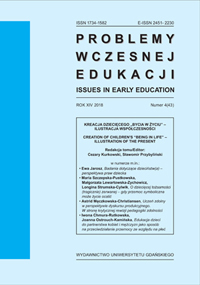Opening tasks, opening minds – a rediscovery of the open-ended approach
Opening tasks, opening minds – a rediscovery of the open-ended approach
Author(s): Kalina JastrzębowskaSubject(s): Education
Published by: Uniwersytet Gdański
Keywords: dialogic teaching; early childhood mathematics education; mathematical problem solving; open-ended approach; settings in dialogic classroom
Summary/Abstract: Open-ended tasks are designed such that they may have more than one correct solution or may be solved in more than one way. Although such tasks constitute an irreplaceable tool for prompting young learners to be actively and creatively involved in mathematical discourse, their implementation poses a challenge. Primary school students in Poland are usually offered algorithmic and rote teaching methods and are thus very often deprived of important elements of successful mathematics learning. The ubiquitous teacher-centred approach dedicates little time to any contribution from learners. The aim of this design research was to implement a change in early childhood mathematics education. The change comprised students creating and/or solving open-ended tasks in groups, thus promoting dialogic teaching. The results confirmed that students who are challenged with openended tasks through dialogic teaching not only genuinely engage in their activities, develop a better number sense and flexibility of thinking, but also help each other gain a deeper understanding of new concepts. Captured in this research were the synergistic images of the beauty of children’s reasoning and the beauty of mathematics as an open subject – an incentive for others to begin their journey with freedom of speech for young mathematicians.
Journal: Problemy Wczesnej Edukacji
- Issue Year: XVII/2021
- Issue No: 1 (52)
- Page Range: 181-195
- Page Count: 15
- Language: English

